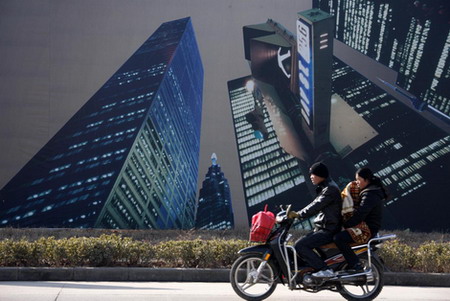
Home sales in major cities contracted while property prices remained stable during the Spring Festival holiday as buyers and property developers wait for more policy clues from the upcoming sessions of the nation's legislature and advisory body.
According to China Index Institute, a real estate industry research organization, cold winter weather halted many transactions in Beijing, Nanjing and Hangzhou during the Spring Festival holiday - between Feb 13 and Feb 19.
"Intense tightening of real estate policies has intensified buyers' wait-and-see attitude, while shrinking supply also led to sluggish sales," said Hu Jinghui, vice-president of 5i5j, a real estate agency based in Beijing.
While new apartment prices remain at near record-high levels, property prices in Shenzhen and Hangzhou have dropped, though it still remains above 20,000 yuan per sq m. New apartment prices in Chongqing, Wuhan and Tianjin also hit record highs.
Some property developers are still planning price increases in March.
Statistics from Soufun.com, a real estate industry website, show that 52 property projects will be launched in Beijing next month, with an average price of 22,000 yuan per sq m, up from 19,383 yuan per sq m during the holiday.
Despite low property sales, customer sentiment has undergone subtle changes compared with last year.
While some buyers are still taking a wait-and-see attitude, others would rather take advantage of the market's downturn.
During the seven-day holiday, property agency Centaline China's 130 outlets in Beijing received 1,000 buyer representation requests, up 67 percent from the same period last year. According to a survey by the agency, 52 percent of customers are still searching for the right home and will buy if they find one that matches.
Since the Spring Festival is usually a slow period for home purchases, industry experts say market trends will be clearer after March, especially after the "two sessions", the annual meetings of the National People's Congress and the Chinese People's Political Consultative Conference.
Since late January this year, nine ministers have launched fact-finding missions to investigate markets in both first- and second-tier cities, covering hot issues including curbing speculative home purchases, building more affordable housing and improving land-leasing practices.
The initial results of the missions will be submitted to the State Council before the two sessions take place, and will serve as the basis for policy consideration.
An industry expert who took part in one mission said property prices would probably pick up in the second quarter, so policies may tighten accordingly prior to that period.
Qin Hong, deputy director of the policy research center under the Ministry of Housing and Urban-Rural Development, said the central government will probably enact more real estate policies during or after the two sessions, to promote the healthy development of China's property sector.